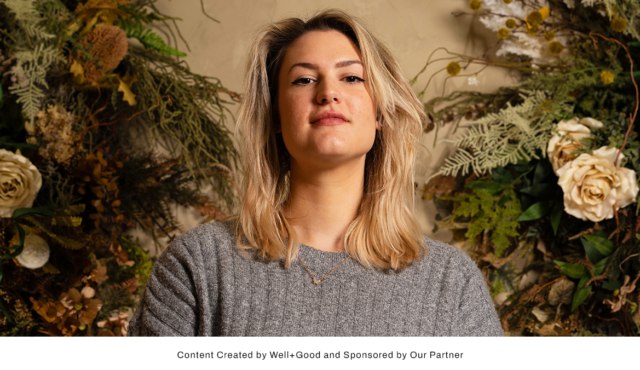Have you ever stumbled (er, scrolled) upon an Instagram post and felt *totally* seen? Say what you will about the always-on digital world—at its core, social media is designed to connect people and help them feel less alone. And sometimes, it does a really solid job.
That’s certainly true for Alexis Smith, an eczema advocate who’s no stranger to the loneliness, secrecy, and insecurity that can come from living with a chronic skin condition. “Constantly being aware of what I looked like and what other people thought of me consumed my mind,” she says, “and all of that added stress certainly didn’t make my eczema any better.” She let it consume her life in secret—that is, until she turned to social media. “When I was 19, I started my Instagram account in an attempt to normalize skin conditions and make them more visible to those who may not know what [eczema] is.”
Fast forward a few years (through a buzzing social network, magazine covers, countless eczema expos, an online business, and more), and the self-proclaimed “skinfluencer” is shedding light and love on skin conditiong, one Instagram post at a time. Whether you live with eczema or your skin struggles look different, read Smith’s story and you might just get inspired to start your own social-media movement.
How Smith’s social story started
In the throes of her struggles with eczema, Smith searched for solidarity on all her favorite apps—but, scroll as she might, she couldn’t find anyone in her feeds that she could relate to. “There wasn’t any representation on social media,” she says, so she decided to create it herself.
Her intent was simply to normalize eczema a bit. “Starting an Instagram account didn’t feel heroic, and I’m not sure I ever expected to make a difference,” she says. “I wanted it to reach people who have it, so they feel less alone, and I wanted it to reach people who [don’t] have it, so they could hopefully be more educated and less likely to make someone with eczema feel…‘different.’”
One unintended effect of creating a platform to empower others? Experiencing that same empowerment for herself, too. “In the beginning, I felt some imposter syndrome because…I was telling all of these people to be confident and show off their skin, but I still wasn’t entirely confident in myself,” she says. “[But] seeing how something as simple as posting unfiltered pictures of myself with [an] eczema flare-up helped people encouraged me to keep going—and it ended up helping my self-esteem, too.”
How it’s going
These days, Smith fills her time speaking at expos, designing eczema-inspired apparel, shining on the occasional Times Square billboard (yes, seriously), and always uplifting her social community with honesty and authenticity. “For the longest time, the only representation of eczema was basically medical photographs [of] someone’s arm or leg, just a picture of the eczema itself,” she says. “It was important to me to post photos of myself so you could see the person attached to the eczema.”

Instagram has taught Smith a lot about advocacy, too. “Early on in my eczema journey, I thought [that]…you go to the doctor and just do whatever they tell you.” Over the years, she’s seen how important it is to do her own research and learn from others in the eczema community—and “social media is excellent for this,” she says. Now, she comes to her appointments armed with knowledge that helps her make shared decisions, establish collaborative relationships with her doctors, and cultivate a bit more long-term comfort.
How she celebrates her skin
One way Smith celebrates her skin is through an ever-growing gallery of body art. “I’ve always been the artsy girl and tattoos have been a way for me to express that,” she says. A pause symbol on her wrist is especially meaningful to her—when she looks down, she remembers to stop and reflect on all the beautiful moments she’s had throughout her life.
Her tops tips for people with eczema who are interested in getting inked? Stick to areas where an eczema flare-up is less common and always keep coconut oil on hand for moisturizing. (Check out her story highlights for more tips about eczema and tattoos).

She’s also found joy in starting Lazy Babe Co., a clothing-and-accessories brand on a mission to make eczema more lighthearted. It began when she designed a few silly eczema slogan shirts (think: “Yes, I’ve tried coconut oil” and “It ain’t easy being itchy”), wore them at an eczema expo, and caught the attention of other attendees. Since then, they’ve become conversation-starters that encourage people to ask questions. “[Wearing] my eczema shirts is a way for me to say, ‘yes, I’m aware of the red patches on my skin, and I’m okay!'”
At the end of the day, Smith’s slogan is simple: “Having eczema does not make you ugly,” she says. “I’ve had a lot of people tell me they didn’t realize how badly they needed to hear that,” and she credits Instagram for amplifying the message. As for the silent struggle with eczema that she transformed into a social-media movement? “I can’t express how thankful I am that I was able to find this community—and how much they’ve helped my journey.”











